最新非谓语动词(完整版)
非谓语动词最完整版

aim
agree
arrange
ask
decide
bother
care
choose
demand
desire
determine
elect
endeavor
hope
fail
help
learn
long渴望
mean
manage
offer
plan
pretend
refuse
tend
undertake
expect
完成
to have done
to have been done
先于谓语动作发生
We seem to have met each other before.
完成进行
to have been doing
先于谓语动作发生而又延续到谓语动作发生后
He is said to have been studying abroad,but I don’t know which country he is studying in.
3. ______( see ) is to believe.
4._____________________ (beat) in the home match was a disgrace to them..
5.在一个小时之内记住所有这些单词是不容易的。(翻译成英文)
6.It is important ________ to turn off the light when you leave the room.
A. for us to beB. for us toC. of us to beD. for your being
非谓语动词用法精讲(完整版)-(共133张)
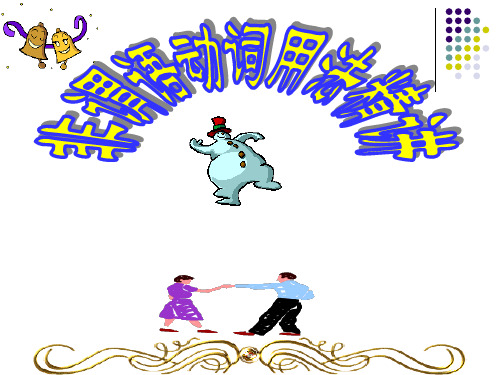
● ② 动词-ing形式的完成式一般只用来作状语, 不作定语。两个分词所表示的时间有先后,不 用分词作定语表示先时性。 【误】The temple having been destroyed by the earthquake will be rebuilt soon. 【正】The temple which has been destroyed by the earthquake will be rebuilt soon. 被地 震毁坏的庙宇很快就要重建了。
A. paying B. paid C. to be paid D. being paid
④. The repairs cost a lot ,but it’s money well ________. A.to spend B.Spent C.being spent D.Spending
4、分词作状语
B. hanging
C. hangs
D. being hung
②.Reading is an experience quite different from watching TV; there are pictures _____ in your mind instead of before your eyes.
Do you know anyone having lost a cat? × Do you know anyone who has lost a cat? √
c. 不定式作定语,指将来的时间,与被修饰词 形成主谓、动宾、同位关系或修饰关系。
The next train to arrive was from New York. This is the material ___ in the lab tomorrow.
非谓语动词完整版

It is + adj. + (of / for sb.) to do sth. It’s no good / no use/ not any use/good, useless doing sth. There’s no doing ….
Listen! The song being sung is very popular with the students.
2. doing 表示动作正在进行 done 表示动作动作已经结束 to do 表示将来
The students have cleared away the _f_a_ll_en__(fall) leaves.
非谓语做状语
做状语
To do
目的,结果,原 因
In order to , so as to
I cannot but agree to his terms. We could do nothing but / other than wait. I cannot choose but ________ (laugh) We had no choice but __________ (wait)
but to do except to do besides to do other than to do
当介词but, except, besides 以及 other than 前有作为实意动词的 do时,不定式的to 可以省略。
Can’t choose but do (只好) Can’t help but do Can’t but do
英语-非谓语动词-用法-讲解-知识点总结-完整版-最全-归纳-专项精选全文完整版
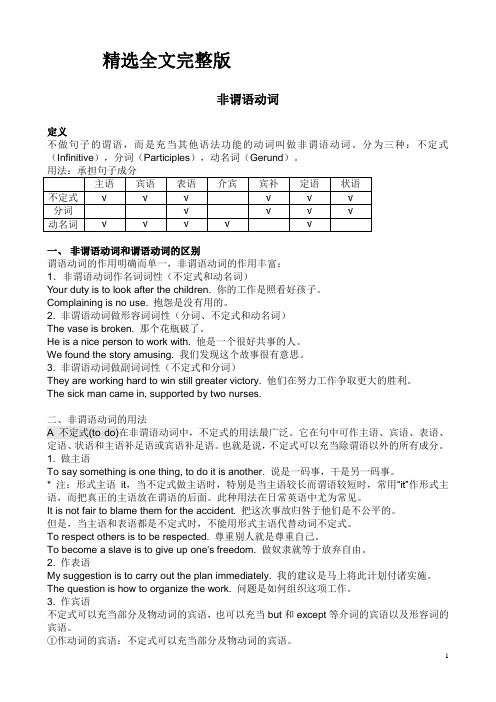
精选全文完整版非谓语动词定义不做句子的谓语,而是充当其他语法功能的动词叫做非谓语动词。
分为三种:不定式(Infinitive),分词(Participles),动名词(Gerund)。
一、非谓语动词和谓语动词的区别谓语动词的作用明确而单一,非谓语动词的作用丰富:1.非谓语动词作名词词性(不定式和动名词)Your duty is to look after the children. 你的工作是照看好孩子。
Complaining is no use. 抱怨是没有用的。
2. 非谓语动词做形容词词性(分词、不定式和动名词)The vase is broken. 那个花瓶破了。
He is a nice person to work with. 他是一个很好共事的人。
We found the story amusing. 我们发现这个故事很有意思。
3. 非谓语动词做副词词性(不定式和分词)They are working hard to win still greater victory. 他们在努力工作争取更大的胜利。
The sick man came in, supported by two nurses.二、非谓语动词的用法A 不定式(to do)在非谓语动词中,不定式的用法最广泛。
它在句中可作主语、宾语、表语、定语、状语和主语补足语或宾语补足语。
也就是说,不定式可以充当除谓语以外的所有成分。
1. 做主语To say something is one thing, to do it is another. 说是一码事,干是另一码事。
* 注:形式主语it,当不定式做主语时,特别是当主语较长而谓语较短时,常用“it”作形式主语,而把真正的主语放在谓语的后面。
此种用法在日常英语中尤为常见。
It is not fair to blame them for the accident. 把这次事故归咎于他们是不公平的。
(完整版)非谓语的用法总结
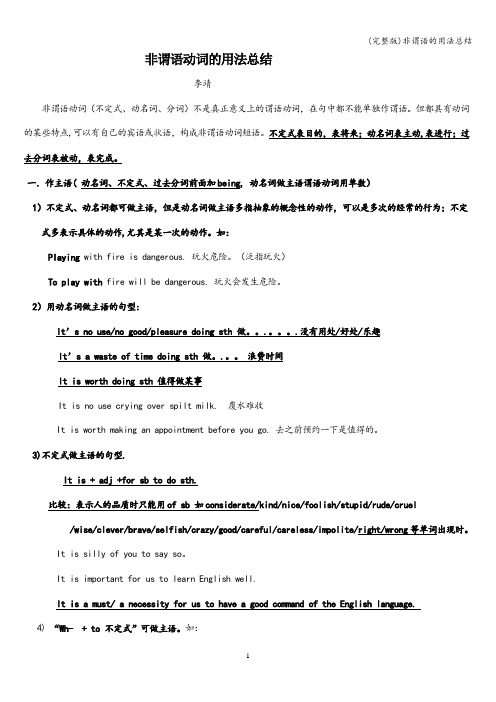
非谓语动词的用法总结李靖非谓语动词(不定式、动名词、分词)不是真正意义上的谓语动词,在句中都不能单独作谓语。
但都具有动词的某些特点,可以有自己的宾语或状语,构成非谓语动词短语。
不定式表目的,表将来;动名词表主动,表进行;过去分词表被动,表完成。
一.作主语( 动名词、不定式、过去分词前面加being, 动名词做主语谓语动词用单数)1)不定式、动名词都可做主语,但是动名词做主语多指抽象的概念性的动作,可以是多次的经常的行为;不定式多表示具体的动作,尤其是某一次的动作。
如:Playing with fire is dangerous. 玩火危险。
(泛指玩火)To play with fire will be dangerous. 玩火会发生危险。
2)用动名词做主语的句型:It’s no use/no good/pleasure doing sth 做。
.。
.没有用处/好处/乐趣It’s a waste of time doing sth 做。
.。
浪费时间It is worth doing sth 值得做某事It is no use crying over spilt milk. 覆水难收It is worth making an appointment before you go. 去之前预约一下是值得的。
3)不定式做主语的句型.It is + adj +for sb to do sth.比较:表示人的品质时只能用of sb 如considerate/kind/nice/foolish/stupid/rude/cruel /wise/clever/brave/selfish/crazy/good/careful/careless/impolite/right/wrong等单词出现时。
It is silly of you to say so。
It is important for us to learn English well.It is a must/ a necessity for us to have a good command of the English language.4) “Wh- + to 不定式”可做主语。
非谓语动词讲解最新版本

能做某事
be used to do
实用文档
被用来做
迫不及待下决心做过去常常未能做的事
can’t wait to do 迫不及待地要做某事
make up one’s mind to do 下决心做某事
used to do
过去常常做某事
fail to do
未能做某事
实用文档
2. 在下列动词或动词短语后常用动名词做宾语: admit, advise, allow, avoid, bear, cannot help, consider, delay, enjoy, finish, give up, imagine. include, keep, keep on, mind, miss, put off, permit, practice, resist, risk, suggest, stand, insist on, be busy, be worth, feel like, can’t stand, think of, dream of, be fond of, prevent…(from), keep…from, stop…(from), protect…from, be engaged in, spend…(in), succeed in, admit to, be/ get/ become used to, be equal to, devote…to, get down to, look forward to, object to, stick to, take to, see to, lead to, pay attention to等。
What ∕ How about doing 做某事怎么样?
实用文档
此to 非彼to
英语非谓语动词题20套(带答案)

最新英语非谓语动词题20套(带答案)一、非谓语动词1.—Do you have any plans for the holiday?—Yes, I'm planning to travel to Jiuzhaigou. I'm looking forward to the colourful lakesand amazing waterfalls.A. seeB. seeingC. seesD. saw【答案】 B【解析】【分析】句意:——你有度假的计划吗?——是的,我打算去九寨沟旅行。
我期待着看到五颜六色的湖泊和令人惊叹的瀑布。
look forward to+名词/代词/动名词,期盼......,see动词,要用动名词形式seeing,故选B。
【点评】考查固定搭配look forward to的用法。
注意接动词时要用动名词形式。
2.When you are tired, in the countryside is a wonderful experience.A. relaxingB. relaxedC. relaxD. relaxes【答案】 A【解析】【分析】考查非谓语动词。
句意:当你累的时候,在农村放松是一个奇妙的体验。
所填动词在句中作主语,该用动名词形式,所以选A。
3.—Have you ever heard that China is building a nationwide 5G network?—Right. 5G will allow us ________ English movies faster than ever.A. downloadB. downloadsC. to downloadD. downloading【答案】 C【解析】【分析】句意——你听说了中国正在建造全国5G网络吗?——对,5G将会让我们比原来更快的速度下载英文电影。
allow sb to do sth,允许某人做某事,固定短语,应使用动词不定式,故答案是C。
(完整版)非谓语动词归纳总结
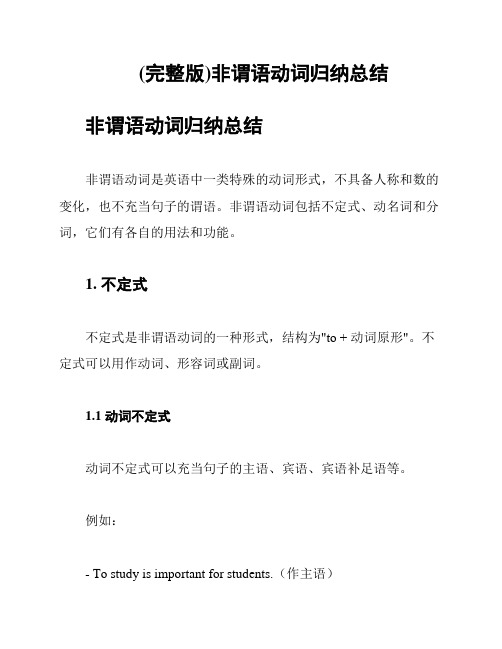
(完整版)非谓语动词归纳总结非谓语动词归纳总结非谓语动词是英语中一类特殊的动词形式,不具备人称和数的变化,也不充当句子的谓语。
非谓语动词包括不定式、动名词和分词,它们有各自的用法和功能。
1. 不定式不定式是非谓语动词的一种形式,结构为"to + 动词原形"。
不定式可以用作动词、形容词或副词。
1.1 动词不定式动词不定式可以充当句子的主语、宾语、宾语补足语等。
例如:- To study is important for students.(作主语)- I want to learn English.(作宾语)- She asked me to help her.(作宾语补足语)1.2 形容词不定式形容词不定式用于修饰名词或代词。
例如:- I have a book to read.(修饰名词)- He is the man to trust.(修饰代词)1.3 副词不定式副词不定式用于修饰动词、形容词或副词。
例如:- She worked hard to pass the exam.(修饰动词)- He is happy to see you.(修饰形容词)- She walked quickly to catch the bus.(修饰副词)2. 动名词动名词是非谓语动词的一种形式,结构为动词的现在分词形式。
动名词可以充当句子的主语、宾语、宾语补足语等。
例如:- Swimming is good exercise.(作主语)- I enjoy playing basketball.(作宾语)- She kept on talking.(作宾语补足语)3. 分词分词是非谓语动词的一种形式,根据时态和完成程度的不同,分词分为现在分词和过去分词。
3.1 现在分词现在分词用于表示主动或进行的动作。
例如:- The running boy is my brother.(作定语)- She stood there, crying.(作状语)3.2 过去分词过去分词用于表示被动或完成的动作。
非谓语动词完整版

We have written the composition.(谓语动词的完成时) Having written the composition, we handed it in.(现在 分词的完成式)
(一)、不定式的形式: 主动形式 一般式 进行式 完成式 to do to be doing to have done
(1)forget to do 忘记要去做某事(此事未做) forget doing忘记做过某事(此事已做过或已发生) (2)stop to do 停止、中断(某件事),目的是去做另一件事 stop doing 停止正在或经常做的事 (3)remember to do 记住去做某事(未做) remember doing 记得做过某事(已做) (4)regret to do对要做的事遗憾(后常跟动词say, tell, inform等) regret doing对做过的事后悔 (5)try to do努力、企图做某事 try doing试验、试一试某种办法
Practice (1) What I would suggest is ________(start) work at once.
(2) His hobby is _______(collect) stamps.
(3) Travelling is __________(interest) but _______(tire). (4) What the workers have been told is that they __________(获得报酬) by the hour.
4)完成被动式: He forgot having been taken to Guangzhou when he was five years old. 他忘记五岁时曾被带到广州去过。 Having been told many times, the naughty boy made the same mistake. 5)否定式:not + v-ing I regret not following his advice. 我后悔没听他的劝告。
非谓语动词归纳总结(可编辑修改word版)
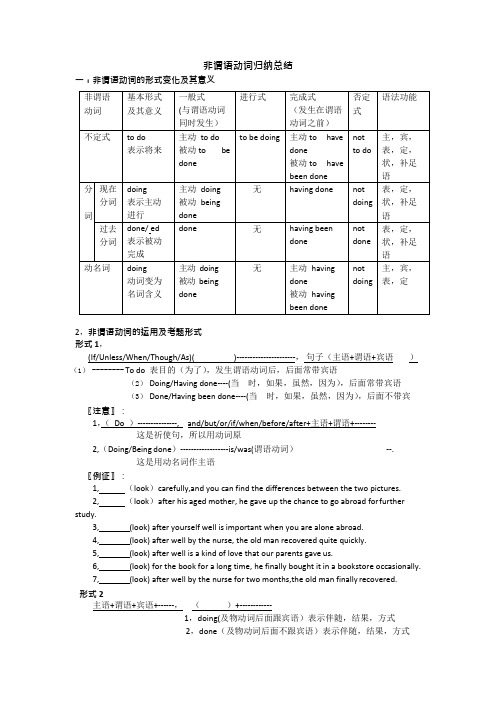
非谓语动词归纳总结一,非谓语动词的形式变化及其意义2,非谓语动词的运用及考题形式形式1,(If/Unless/When/Though/As)( )----------------------,句子(主语+谓语+宾语 ----- )(1)-------- To do 表目的(为了),发生谓语动词后,后面常带宾语(2)Doing/Having done----(当 - 时,如果,虽然,因为),后面常带宾语(3)Done/Having been done----(当-- 时,如果,虽然,因为),后面不带宾〖注意〗:1,(Do )---------------, and/but/or/if/when/before/after+主语+谓语+--------这是祈使句,所以用动词原2,(Doing/Being done)------------------is/was(谓语动词) ------------------------------ --.这是用动名词作主语〖例证〗:1,(look)carefully,and you can find the differences between the two pictures.2,(look)after his aged mother, he gave up the chance to go abroad for f urther study.3, (look) after yourself well is important when you are alone abroad.4, (look) after well by the nurse, the old man recovered quite quickly.5, (look) after well is a kind of love that our parents gave us.6, (look) for the book for a long time, he finally bought it in a bookstore occasionally.7, (look) after well by the nurse for two months,the old man finally recovered.形式2主语+谓语+宾语+------,()+------------1,doing(及物动词后面跟宾语)表示伴随,结果,方式2,done(及物动词后面不跟宾语)表示伴随,结果,方式3,only to do 表示结果〖例证〗1,A hearty laughter releases physical tension, ( )(leave) our muscle relaxed for half an hour. 2,The old grandma got off the bus, ()(support)by her granddaughter.3,We hurried to the railway station, only( )(find) the train had already left.4,He got up,washed his faces,had his breakfast, and( )(go) to work.形式3主语()+ 谓语+ 宾语()+-------------1,to do 将要做的to be done 将被做的(作定语或宾语补足语)2,doing 正在做的being done 正在被-- 的(作定语或宾语补足语)3,done 被----了的(作定语或宾语补足语)〖例证〗1,Anyone (see) (carry)bags,boxes,cases was stopped by the police.(作定语)2,Steam can be seen (rise) when water is heated.(作主语补足语)3,Seeing the roads (cover) with snow and ice, we decided to stay at home.(作宾语补足语)4,The building (complete) next month will be used as a laboratory.(作定语)5,The problem (discuss) now is not the one (discuss)at yesterday’s meeting (作定语)6,He spoke loudly enough to make himself (hear) clearly.(作宾语补足语)7,The government has taken effective measures (improve) the air condition in Beijing.(作目的状语)8,Don’t keep the water (run) when you brush teeth.(作宾语补足语)3,固定搭配1,跟不定式作宾语的动词Aim,appear,agree,arrange,decide,choose,demand,desire,determine,expect,hope,fail,happen, hesitate,learn,mean,manage,offer,plan,prepare,pretend,promise,refuse,attempt,want2,跟动名词作宾语的动词Consider,suggest,advise,excuse,pardon,admit,delay,putoff,fancy,avoid,miss,keep,practice,deny,finish,enjoy,appreciate,can’t help,forbid,imagine,risk,mind,allow,permit,escape3,to 后面跟动名词的短语Be/get used to,be related to,be addicted to,be opposed to,be devoted to,be adjusted to,be connected to,be compared to,lead to,object to,look forward to,stick to,pay attention to,contribute to,make contributions to,reply to,turn to,belong to,respond to。
非谓语动词完整ppt课件可修改文字

do
让…做…
be done 让… 被做
to do
get + sb./sth.+ doing
done
精选
让…做… 让…做… 让… 被做
do
have +sb./sth. +
doing done
让…做… 让…持续做…
让 …被做
注意:1.have sth. done 还表示 “使…遭受…”
Eg: Mr.Smith had his house broken into while he was away on holiday.
I`m sure of him coming on time. He has never heard of a woman being a pilot. I don’t mind Jack (him) going. She hates young people (them) smoking.
精选
独立主格结构
精选
It's impolite of you to speak to the teacher like that.
句型2:It + 谓语 + to do
It takes us an hour ___ get there by bus.
句型3:It’s + n. + to do
It’s our duty __ help the poor.
4.The swimming pool in our village is being built. (作定语)
精选
作宾语 ①
enjoy finish practice mind avoid suggest admit escape miss imagine risk 精选
非谓语动词(完整版)
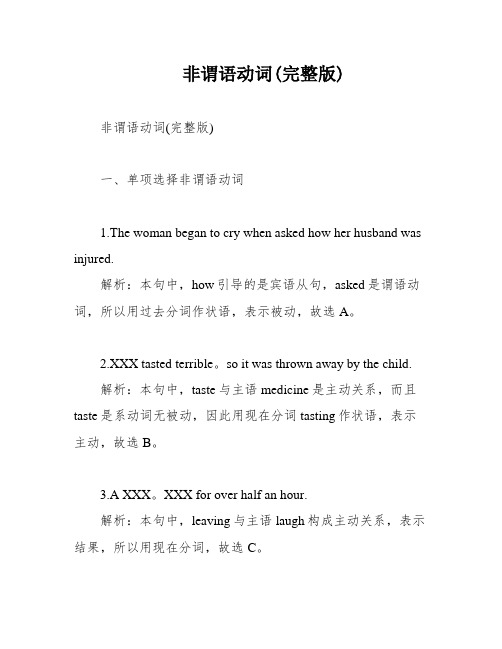
非谓语动词(完整版)非谓语动词(完整版)一、单项选择非谓语动词1.The woman began to cry when asked how her husband was injured.解析:本句中,how引导的是宾语从句,asked是谓语动词,所以用过去分词作状语,表示被动,故选A。
2.XXX tasted terrible。
so it was thrown away by the child.解析:本句中,taste与主语medicine是主动关系,而且taste是系动词无被动,因此用现在分词tasting作状语,表示主动,故选B。
3.A XXX。
XXX for over half an hour.解析:本句中,leaving与主语laugh构成主动关系,表示结果,所以用现在分词,故选C。
4.When asked for his views about his teaching job。
Philip said he found it very interesting and rewarding.解析:本句中,when引导的是省略句,完整的是when he was asked his view about his job as a teacher,这里当从句中的主语与主句的主语一致,并且从句的谓语动词有be时,这时从句的主语与be同时省略,故选B。
二、改写句子1.Being asked how her husband was injured。
XXX.2.XXX.3.A XXX for over half an hour.4.Philip found XXX when he was asked for his views about it.1.The company has decided to implement a new policy to ce the use of plastic bags。
非谓语用法总结-高考完整版
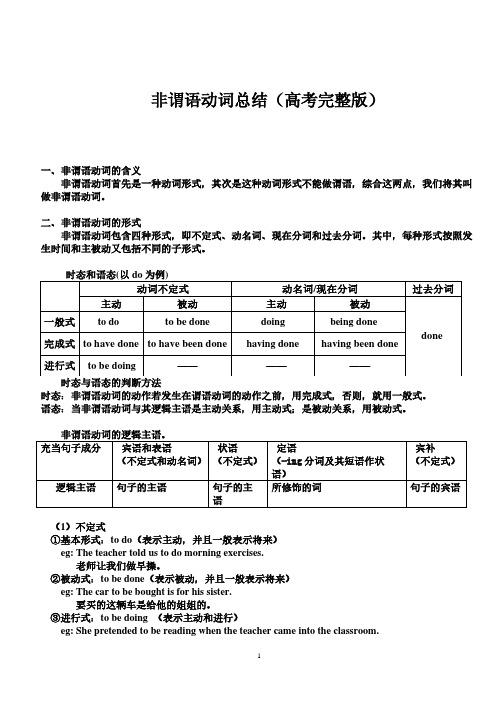
非谓语动词总结(高考完整版)一、非谓语动词的含义非谓语动词首先是一种动词形式,其次是这种动词形式不能做谓语,综合这两点,我们将其叫做非谓语动词。
老师进来时,她假装正在读书。
④完成时:to have done(表示主动和完成)eg: The thief is said to have escaped.据说小偷已经逃跑了。
⑤完成被动式:to have been done(表示被动和完成)eg:The thief is said to have been arrested.据说小偷已经被抓住了。
⑥完成进行式:to have been doing (表示主动和完成进行)eg: She is said to have been working in the factory over the last 20 years.据说在过去的20年里,她一直在这家工厂工作。
(2)动名词①基本形式:doing (表示主动)eg: Travelling in space by ordinary people will be common in the future.在未来,普通人在太空旅行将会是普遍的事情。
②被动式:being done(表示被动)eg: Freddy and his band could go nowhere without being followed by their fans.弗雷迪和他的乐队到哪里都被他们的粉丝跟着。
③完成式:having done(表示主动和完成)eg: I have no idea of his having done such a thing against you.我不知道他做过这样一件违背你的事情。
④完成被动式:having been done(表示被动和完成)eg: Many customers complain of having been given short weight at that shop.很多顾客抱怨在那家商店被缺斤少两过。
非谓语动词(整理)可修改文字

E. 有些动词后面既可跟不定式to do,又可跟动名
动词不定式的时态和语态
㈠. 一般式( to do ). 所表示的动作在谓
语动词之后发生。
被动式:to be done (将要…)
1. I opened the door to enter the room. 2. Mr. Smith is going to attend the meeting to be held tomorrow. 3. He didn’t like to be laughed at.
Made Curie was the first person in the world to receive two Nobel Prizes.
The best way to keep fit is to develop healthy eating habits.
2. 当修饰词是名词 : ability, way, chance , attempt, plan, failure 等, 这时用不定式作定语, 对所修饰词起补充说明的作用.
9) used to do
表示过去常常做某事
be/get used to doing 表示习惯于做某事
注:need/want/require; worth/worthy 的特殊用法
1) need/want to be done = need/want doing 需要(含被动意义)
The bike needs to be repaired. The room needs repairing.
(完整版)非谓语动词归纳总结
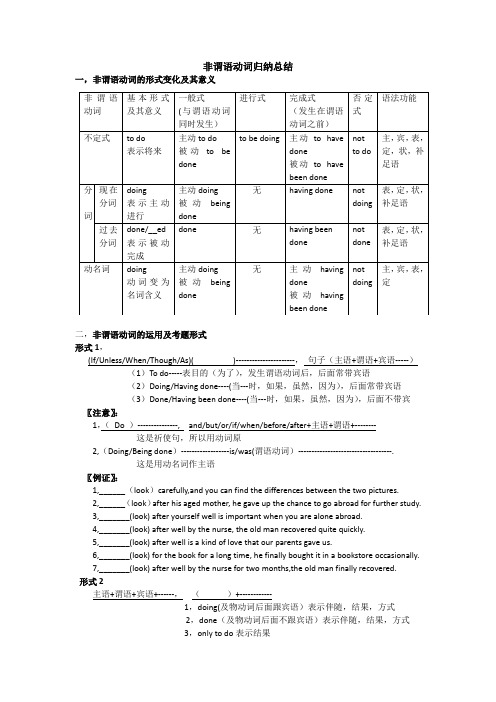
非谓语动词归纳总结一,非谓语动词的形式变化及其意义二,非谓语动词的运用及考题形式形式1,(If/Unless/When/Though/As)( )----------------------,句子(主语+谓语+宾语-----)(1)To do-----表目的(为了),发生谓语动词后,后面常带宾语(2)Doing/Having done----(当---时,如果,虽然,因为),后面常带宾语(3)Done/Having been done----(当---时,如果,虽然,因为),后面不带宾〖注意〗:1,(Do )---------------, and/but/or/if/when/before/after+主语+谓语+--------这是祈使句,所以用动词原2,(Doing/Being done)------------------is/was(谓语动词)-----------------------------------.这是用动名词作主语〖例证〗:1,______(look)carefully,and you can find the differences between the two pictures.2,______(look)after his aged mother, he gave up the chance to go abroad for further study.3,_______(look) after yourself well is important when you are alone abroad.4,_______(look) after well by the nurse, the old man recovered quite quickly.5,_______(look) after well is a kind of love that our parents gave us.6,_______(look) for the book for a long time, he finally bought it in a bookstore occasionally.7,_______(look) after well by the nurse for two months,the old man finally recovered.形式2主语+谓语+宾语+------,()+------------1,doing(及物动词后面跟宾语)表示伴随,结果,方式2,done(及物动词后面不跟宾语)表示伴随,结果,方式3,only to do表示结果〖例证〗1,A hearty laughter releases physical tension, ( )(leave) our muscle relaxed for half an hour. 2,The old grandma got off the bus, ()(support)by her granddaughter.3,We hurried to the railway station, only( )(find) the train had already left.4,He got up,washed his faces,had his breakfast, and( )(go) to work.形式3主语()+ 谓语+ 宾语()+-------------1,to do将要做的to be done将被做的(作定语或宾语补足语)2,doing正在做的being done正在被---的(作定语或宾语补足语)3,done被----了的(作定语或宾语补足语)〖例证〗1,Anyone________(see)________(carry)bags,boxes,cases was stopped by the police.(作定语)2,Steam can be seen__________(rise) when water is heated.(作主语补足语)3,Seeing the roads _____(cover) with snow and ice, we decided to stay at home.(作宾语补足语)4,The building _________(complete) next month will be used as a laboratory.(作定语)5,The problem______(discuss) now is not the one _____(discuss)at yesterday’s meeting (作定语)6,He spoke loudly enough to make himself __________(hear) clearly.(作宾语补足语)7,The government has taken effective measures________(improve) the air condition in Beijing.(作目的状语)8,Don’t keep the water ________(run) when you brush teeth.(作宾语补足语)三,固定搭配1,跟不定式作宾语的动词Aim,appear,agree,arrange,decide,choose,demand,desire,determine,expect,hope,fail,happen, hesitate,learn,mean,manage,offer,plan,prepare,pretend,promise,refuse,attempt,want2,跟动名词作宾语的动词Consider,suggest,advise,excuse,pardon,admit,delay,putoff,fancy,avoid,miss,keep,practice,deny,finish,enjoy,appreciate,can’t help,forbid,imagine,risk,mind,allow,permit,escape3,to后面跟动名词的短语Be/get used to,be related to,be addicted to,be opposed to,be devoted to,be adjusted to,be connected to,be compared to,lead to,object to,look forward to,stick to,pay attention to,contribute to,make contributions to,reply to,turn to,belong to,respond to。
- 1、下载文档前请自行甄别文档内容的完整性,平台不提供额外的编辑、内容补充、找答案等附加服务。
- 2、"仅部分预览"的文档,不可在线预览部分如存在完整性等问题,可反馈申请退款(可完整预览的文档不适用该条件!)。
- 3、如文档侵犯您的权益,请联系客服反馈,我们会尽快为您处理(人工客服工作时间:9:00-18:30)。
最新非谓语动词 (完整版)一、单项选择非谓语动词1.With my money ______ , I went back home. A .ran out of C .running out【答案】 C 【解析】2. He is thought ___foolishly .Now he has no one but himself to blame for losing the job. A .to actB . to have actedC . actingD .having acted【答案】 B 【解析】试题分析:句型“有人认为 ..已 可”用 It is thought/ believed/ ...that sb have/hasdone...结 构。
从句中的动作发生在主句动作之前。
该结构可转化为 sb is thought/believed +不定式的 完成式。
如:It is reported that Cheng Yifei died several days ago. The news reports that Cheng Yifei died several days ago.Cheng Yifei is reported to have died several days ago. 因此B 选项正确。
句意为“有人认为他已做了一件傻事。
现在应怪他自己丢掉这份工作。
考点:考查动词非谓语形式。
Seeing 才能表示主语与非谓语的 “主动”的逻辑关系。
by the advances in technology, many farmers have set up wind farms ontheir land.解析】B .ran out D .running out of试题分析:考查 with 复合结构,句意:我的钱用完了, 里做原因状语,with+宾语+宾语补足语(非谓语动词) 物动词,后面要接宾语,否则是被动语态,排除 式,选 C 。
考点:考查 with 复合结构我就回家了。
With 复合结构在这 AB 项,run out of 是及D ,,所以排除Run out 是不及物动词,不能用被动 3. A .Seeing【答案】 A that she was going off to sleep, Iasked if she d like that little doll on her bed. B .To seeD . Seen【解析】考查非谓语动词的用法。
本句的主语是I , I 与See 的意义的逻辑关系是主动,也就是4.A .Being encouraged C .Encouraged【答案】 CB .Encouraging D .Having encouraged试题分析:考查过去分词做状语:句意:被科技的进步鼓舞着,很多农民在自己的土地上建起了风力发电厂。
逗号前面的是非谓语动词做状语,encourage 和这句话的主语many farmers 是被动关系,用过去分词做状语,选C。
考点:考查过去分词做状语5.(山东) There is a note pinned to the door A.saying ______ when the shop will open again.B saysC.said【答案】A【解析】D.having said试题分析:在这个句子中note和say是主动关系,所以要用saying。
此处saying引导的句子做伴随状语。
句意为:门上钉着张纸条,写着这家商店什么时候再营业。
故答案选考点:考查非谓语动词。
A。
【知识拓展】非谓语动词的选择要根据所填的动词及它所要修饰的逻辑主语之间的关系确定。
doing 表主动表进行;done 表被动表完成;to do 表目的表将来。
【名师点睛】本题考查非谓语。
先把句子简化:There is a note (which is pinned to the door) saying when the shop will open again. 伴随状语是指状语从句的动作伴随主句发生,它所表达的动作或状态是伴随着句子谓语动词的动作而发生或存在的,本题考查的是现在分词做伴随状语,用ing 形式。
现在分词短语表示与主句的主语在逻辑上有主谓关系,即表示主动意义;而过去分词短语则表示与主句的主语在逻辑上是动宾关系,即被动意义;如:He went to the classroom holding two books ;He went to the forest , followed by two dogs.6.(福建) _______ the past year as an exchange student in Hong Kong, Linda appears moremature than those of her age. A.SpendingC.Having spent B.Spent D.To spend【解析】试题分析:花费”和其逻辑主语“Li nda之间是主动关系,故用现在分词作原因状语。
且费”的动作明显早于“看起来成熟”这个动作。
表示发生在谓语动作之前的动作,用现在分词的完成时。
句意:由于Linda 过去几年在香港作交换留学生,所以她看起来比她的实际年龄更成熟。
考点:考查非谓语动词的用法。
7.Time, correctly, is money in the bank.A.to use【答案】BB.used C.using D.use【解析】本题考察非谓语动词。
根据句子结构,所填成分是对主句的补充说明,因此只能是作状 语。
再根据非谓作状主语应与主句一致原则,判断出use 与主语time 之间为被动,因此直接得出答案B 。
句意:时间,如果使用得当的话,就是存在银行里的钱。
8. __ volca noes for many years, I am still amazed at their beauty as well as their poten tial to cause great damage. A . To study C. Having studied【答案】C 【解析】【详解】 考查非谓语动词辨析。
句意:在研究火山多年之后,我仍然对它们的美丽以及它们造成巨 大破坏的潜力感到惊讶。
study 与主语是逻辑主谓关系,且强调 研究”发生在主句谓语动作之前,应使用现在分词的完成式。
故C 选项正确。
9. Recently a survey _____ prices of the same goods in two different supermarkets has causedheated debate among citize ns. A . comparedB . comparing 【答案】B 【解析】 【详解】考查非谓语动词。
句意:最近,一项对两家不同超市的同种商品价格进行比较的调查在市 民中引起了激烈的争论。
分析句子结构可知,该句的主语是a survey ,谓语动词是hascaused ,宾语是heated debate 。
可见,句子结构是完整的,因此我们要选择的只能是非谓 语动词形式。
survey与comp are 之间存在主动关系,因此用现在分词短语作后置定语。
故 选B 。
10. (北京) The n atio nal park has a large collect ion of wildlife, ele phan ts. A . ranging C. to range【答案】A【解析】 试题分析:句意:国家公园有许多的野生动物,包括从蝴蝶到大象等等。
此处野生动物和range 之间是主动关系,用现在分词,故选 考点:考查非谓语动词。
[名师点睛]现在分词和过去分词的区别:B . Studying D . StudiedC. comp ares D . being comparedfrom butterflies toB . range D . rangedA 。
在语态上,现在分词表示主动意义,过去分词表示被动意义;在时间上,现在分词表示的动作往往正在进行或者与谓语动词同时发生,过去分词表示的 动作已经完成或没有一定的时间性。
如:falling leaves 正在下落的树叶fallen leaves 已经落在地上的树叶分词的作用 作定语 单个分词作定语,分词前置。
如:The slee ping boy is my son.The excited people rushed into the buildi ng.分词短语作定语,分词后置;分词修饰不定代词left 等作定语也后置。
如:The girl sta nding un der the tree is my ni ece. The buildi ng built last year is our library.过去分词作定语与其修饰的词是被动关系,相当于一个被动语态的定语从句。
如:the people in vited to the party were famous scie ntists 作状语 现在分词和过去分词在句中可以作时间、原因、方式、伴随、条件、结果等状语。
Not receivi ng any letter from him, I gave him a call. As I didn ‘ t receive any letter from him, I gave him a call. Give n more atte nti on, the trees could have grow n better.If more atte nti on was give n, the trees could have grow n better.( 条件) Walk ing along the street, I ran across my old friend. Bitten by a snake, he was taken to hospital (原因). Though defeated, he didn ‘ t lose!让e 步r ).( He lay on the grass, looking into the sky.(伴随) He came running to tell me the good news.( 方式)注意:选择现在分词还是过去分词,关键看主句的主语。
如分词的动作是由主句的主语发出,分 词就用现在分词,反之就用过去分词。
试比较:(Being ) Used for a long time, the book looks old.由于用了很长时间,这本书看上去很旧。
